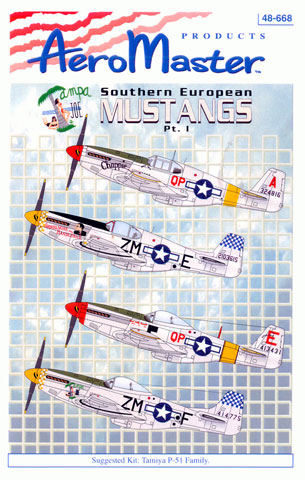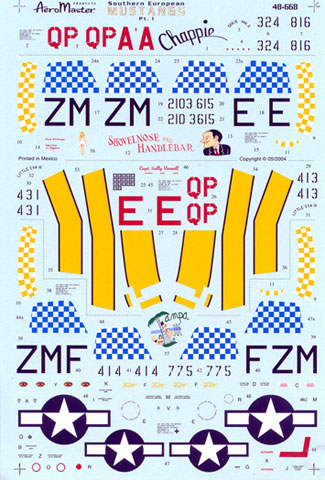|
 Southern
European Mustangs Southern
European Mustangs
Part I
AeroMaster Decals
|
S u m m a r y
|
| Catalogue
Number: |
AMD 48-668 Southern European
Mustangs Pt. I |
| Scale: |
1/48 scales |
| Contents and Media: |
Waterslide decals plus
instructions and notes |
| Price: |
each
USD$8.47 from Squadron.com |
| Review Type: |
FirstLook |
| Advantages: |
Bright and varied markings; perfect register; thin; minimal carrier film; plenty of stencil data; good instructions and background |
| Disadvantages: |
Some kit modifications
required for three options |
| Recommendation: |
Recommended |
Reviewed
by Rodger Kelly

Aeromaster's 1/48 scale
Souther European Mustangs are available online from Squadron.com
|
48-668 is the first sheet in a two-part coverage of
the markings worn by P-51B, F-6C, P-51D and F6D Mustangs that operated
in the skies of Southern Europe in WWII.
Each
sheet carries markings for four machines. They are:
 P-51B
43-24816 Chappie/Dixie Mk X flown by Lieutenant Richard L.
"Dixie" Alexander of the 2nd Fighter Squadron, 52nd Fighter Group. The
aircraft is in the overall natural metal/silver lacquer finish with an
olive drab anti-glare panel, red spinner and yellow bands to the
fuselage, wings and horizontal stabilisers (not supplied). The provided
markings are: P-51B
43-24816 Chappie/Dixie Mk X flown by Lieutenant Richard L.
"Dixie" Alexander of the 2nd Fighter Squadron, 52nd Fighter Group. The
aircraft is in the overall natural metal/silver lacquer finish with an
olive drab anti-glare panel, red spinner and yellow bands to the
fuselage, wings and horizontal stabilisers (not supplied). The provided
markings are:
-
QP squadron and individual aircraft A codes in
red.
-
Black 324816 serial number.
-
The names Chappie and Dixie Mark
X in black. These are separate decals.
-
A data block with the correct serial.
-
A scoreboard comprising five swastikas on
individual white backgrounds.
F-6C
42-103615, Shovelnose and Handlebar, assigned to by Lieutenant
Edward J. Kennedy of the 12 Tactical Reconnaissance Squadron, 10th
Reconnaissance Group during the final few months of the war. The
aircraft is in overall natural metal/silver lacquer finish with a black
anti-glare panel, yellow spinner and black bands to the fuselage, wings
and horizontal stabilisers (not supplied) as well as yellow and white
checkerboard nose squadron markings and blue and white checkerboard tail
group markings. The provided markings are:
-
ZM squadron and individual aircraft E codes in
black.
-
Black 2103615 serial.
-
Yellow and white checkerboard markings for the
nose. These are supplied in three parts to ease placement.
-
Blue and white checkerboard markings for the
tail. These markings are supplied as either blue checkerboards that
you can apply over a white painted tail or as a one-piece blue and
white checkerboard.
-
Nose art for consisting of a characterised head
and shoulders of Bob Hope and the Names Shovelnose and Handlebar.
This marking was painted on the aircraft to commemorate a visit to
the airfield (Furth) was stationed on by the entertainers Bob Hope
and Jerry Cologna in June of 1945.
-
Further nose art in the form of a small painting
of a Vargas Girl. This marking dates back to the previous "owner"
of the machine Lieutenant Robert Hansen.
P-51D 44-13431, Little Eva III, flown by Lieutenant James S.
"Sully" Varnell of the 2nd Fighter Squadron, 52nd Fighter Group. This
machine is also in overall natural metal/painted lacquer finish. It
sports a red nose and spinner as well as black edged yellow bands to the
fuselage, wings and horizontal stabilisers. The provided markings are:
-
QP squadron and E individual aircraft codes in
red.
-
413431 serial in black.
-
The name Little Eva III in black. This
marking is applied in the unusual position over the individual
aircraft letter E on both sides of the fin.
-
A scoreboard comprising 17 swastikas on separate
black rectangle backgrounds.
-
The pilot's name and the names Dalebroux, Jones
and Fleming (ground crew?) in red
-
The blacked edged yellow bands. The fuselage one
is supplied in six parts to ease placement around the tail wheel
well and doors.
-
A stencil data block with the correct serial.
The
final option is F-6D 44-14775 "Tampa Joe" as flown by Lieutenant
Leo Elliott of the 12th Tactical Reconnaissance Squadron, 10th Photo
Reconnaissance Group. It wears the same finish and markings as the
second option and its supplied markings are:
-
ZM squadron and individual aircraft F codes in
black.
-
414775 serial in black.
-
Yellow and white checkerboard markings for the
nose.
-
Blue and white checkerboard markings for the
tail. Same options as the second option.
-
Nose art for consisting of a cartoon palm tree
with two bikini clad attendants and the name "Tampa Joe".
-
A stencil data block with the correct serial.
A
single set of national insignia is and stencil data is supplied for the
all options – read you can only build one machine from the sheet.
The
placement guide is A4 sized in size with full colour side profiles of
each option and plan views of the wings only as well as a further set of
side/plan views to aid in the placement of stencil data.
The
decals have been "Printed in Mexico". They are very well printed, thin
and in perfect register.
The
suggested kit is the "Tamiya P-51 Family" which leads me to the next
point. Only one option can be built straight from the box – the first
one. All of the others will require modification to correctly represent
the aircraft. Having said that though, the modifications are not all
that onerous and can be achieved by using that old skill called
"modelling".
The
decal sheet and placement guide come packed in a clear plastic zip-loc
bag.
Nice
stuff from AeroMaster and they are to be commended for producing decals
for aircraft that are not normally covered by other decal
manufacturers.
Recommended.
Thanks to AeroMaster
/ Eagle Strike Products for the review sets
On-line sales are
available from the
AeroMaster Products /
Eagle Strike Productions web site.
Review TextCopyright © 2005 by
Rodger Kelly
This Page Created on 14 April, 2005
Last updated
13 April, 2005
Back to
HyperScale Main Page |
Home | What's
New | Features
| Gallery |
Reviews | Reference
| Forum
| Search